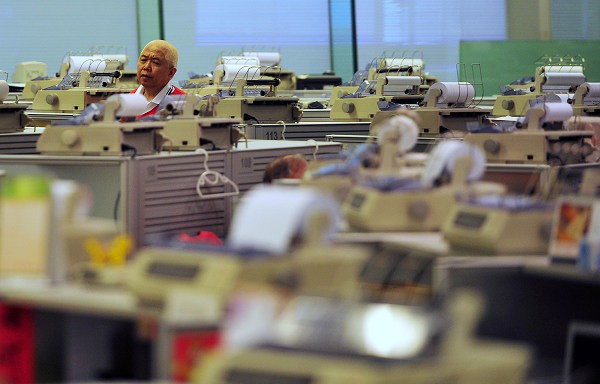Friday, 04 September 2015 09:55
 HONG KONG: Japanese stocks led most Asian shares lower Friday as the yen advanced with investors awaiting a key US jobs report later in the day and after the European Central Bank indicated it could expand its stimulus.
HONG KONG: Japanese stocks led most Asian shares lower Friday as the yen advanced with investors awaiting a key US jobs report later in the day and after the European Central Bank indicated it could expand its stimulus.
With mainland Chinese markets closed for a second day, volatility was minimal and traders were able to focus on macro issues, chiefly the US Federal Reserve’s plans for raising interest rates.
While expectations are for a hike before the end of the year — with US growth picking up — the recent turmoil in global markets caused by China’s ongoing economic crisis has muddied the waters for the Fed’s policy committee.
And Friday’s non-farm payrolls data is seen as crucial in helping the central bank make its decision, with some experts suggesting policymakers could put off a decision until the end of the year.
“A weaker jobs number on Friday may be the straw that breaks the camel’s back for a September rate hike,” Jasper Lawler, a markets analyst at CMC Markets in London, told Bloomberg News.
Jitters about the jobs report on Thursday and Friday weighed on the dollar, which has benefited in the past year from speculation of a rate hike.
It bought 119.89 yen in Tokyo, compared with 120.01 yen in New York and was much lower than the 120.40 yen in Asia earlier Thursday in Asia.
A stronger yen hurts Japanese exporters, whose repatriated profits are boosted by a weaker currency.
The Nikkei was 0.70 percent. Among other Asian markets Hong Kong rose 0.31 percent after returning from a one-day holiday, while Sydney was slightly higher following a sell-off Thursday. There were also losses in Seoul, Singapore and Wellington.
The euro softened after the ECB president Mario Draghi said the bank was ready to ramp up its vast bond-buying scheme — known as quantitative easing (QE) — if needed to kick-start the eurozone economy.
“The asset purchase programme provides sufficient flexibility in terms of adjusting the size, composition and duration of the programme,” Draghi told a news conference after the ECB kept interest rates unchanged at record lows.
The bank also cut its growth and inflation forecasts for 2015-2017, noting the downside risks from low oil prices and the economic slowdown in China.
“Mario Draghi didn’t let markets down. He obliged with not only a promise of more QE if needed but also announced the ECB can now purchase more of any one debt issue,” Lawler said.
A possible widening of QE highlights the divergence of policy between the ECB and the Fed, suppressing the euro.
The single currency fetched $ 1.1132 Friday, against $ 1.1224 in US trade, while it also slipped to 133.34 yen from 135.15 yen.
However, European markets ended sharply higher. London climbed 1.82 percent, Paris gained 2.17 percent and Frankfurt rallied 2.68 percent.




























